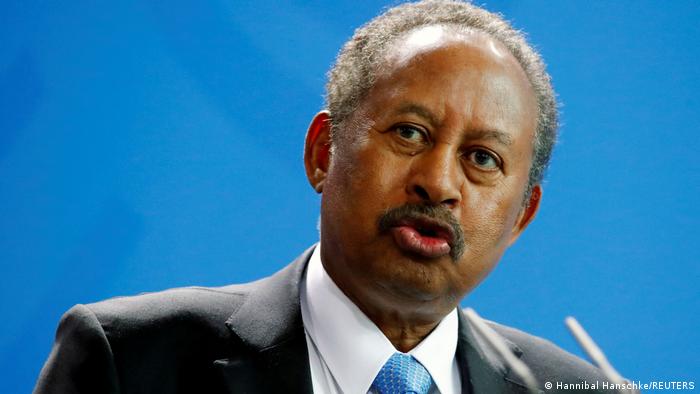
Sudan's military plans to reinstate ousted Prime Minister Abdalla Hamdok following an agreement reached between the military and civilian political parties, Fadlallah Burma Nasir, the head of the Umma Party, said on Sunday.
As part of the deal, Hamdok will form an independent cabinet of technocrats and all political detainees will be released, he added.
However, the party later issued a statement implying that it did not sign off on the deal.
A group of mediators, including academics, journalists and politicians, had been attempting to reach a deal since the political crisis erupted following a military coup. It was finally reached late on Saturday, nearly a month after General Abdel-Fattah Burhan took down the transitional government led by Prime Minister Hamdok and detained its leaders. The general had previously deposed autocrat Omar al-Bashir in 2019.
Hamdok reportedly freed
News agency AFP has reported that Hamdok has been freed from house arrest after a member of his office gave confirmation on Sunday. Hamdok has been under armed guard since the Burhan's declared state of emergency in October.
"The house arrest of Prime Minister Abdalla Hamdok has been lifted and the forces guarding his house have been withdrawn," the official is reported to have told AFP.
Since the news of the latest development, witnesses have reported seeing protesters again rallying against the military in downtown Khartoum, in the state of Kassala and the city of Atbara.
Reuters news agency meanwhile has reported that according to a witness, thousands have marched towards the presidential palace in Khartoum ahead of a meeting with Burhan and Hamdok.
What does the deal include?
Under the agreement, all detainees will be released and Hamdok's position as prime minister will be restored. It will also allow for the resumption of the constitutional, legal and political consensus that governs the transitional period.
The deal was reached after weeks of talks that included political factions, former rebel groups as well as military figures.
Burhan has referred to the military takeover as a step "to rectify the transition." However, following the coup, the military tightened its grip on power, appointing a new military-run Sovereign Council, chaired by Burhan.
The council also included a paramilitary commander, three senior military figures, three ex-rebel leaders and one civilian.
Large-scale opposition to coup
The coup was slammed widely, both inside the country and internationally. Security forces confronted tens of thousands of protesters who took to the streets in the capital Khartoum and Sudan's most populous city Omdurman.
Earlier this month, UN human rights chief Michelle Bachelet called on the military leaders to "step back in order to allow the country to return to the path of progress" after the coup on October 25.
An urgent meeting of the Sovereign Council will be held on Sunday before the agreement is formally announced, reports say.
Still, there seems to be opposition to reaching a deal with the military.
The Forces for the Declaration of Freedom and Change, the group that spearheaded the uprising that culminated in al-Bashir's ouster, objected to any deals with the military.
In a statement Sunday, the group reiterated its opposition to any new political partnership with the military, insisting the perpetrators of the coup should be brought to justice.
"We are not concerned with any agreements with this brute junta and we are employing all peaceful and creative methods to bring it down,'' the statement said. The group also renewed the call for nationwide protests against military rule.
The Umma Party also released a statement stressing its opposition to any deal that fails to "meet the aspirations of all revolutionaries and the Sudanese people."
"The party expresses its faith in the victorious and rebellious resistance and reaffirms that it shall always stand by the people to protect justice," it said.
Kholood Khair, managing partner at the think tank Insight Strategy Partners, told DW that not many are in favor of the deal.
"I think it's important to note that very few people are in favor of this new agreement for the FFC, this body that you mentioned. They've been completely sort of left behind... Their stance has been not to negotiate in the first place with the military because they know that any agreements arising from negotiations with the military at the moment will result in senior military leadership remaining in power."
Khair said the Sudanese youth were ultimately the ones to lose out as the power struggle appears to continue.
"The whole country, I suppose, is a loser in some sense, because the crisis is having manifold impact on different facets of society, particularly the young people who are dying in the streets every day through regime violence."